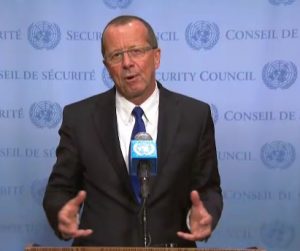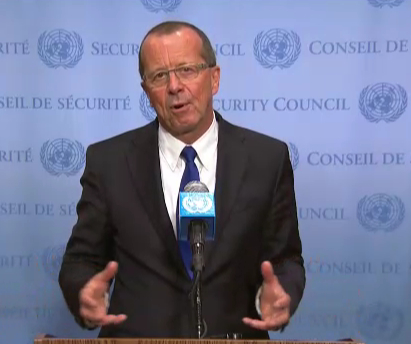By Libya Herald reporters.

Tunis, 13 September 2016:
Khalifa Hafter must have a role in the unified Libyan army, UNSMIL chief Martin Kobler said today in New York.
“I have always said that General Hafter must have a role … and I would like to sit together with him and discuss it” Kobler told a press conference after he had briefed the UN Security Council on the latest developments in Libya. He batted away a reporter’s question about what might be done to persuade Hafter to start talking to the Presidency Council.
Kobler had earlier told the 15-member Security Council that the fragile peace in Libya’s Oil Crescent had suffered a “fierce blow” when army units commanded by Hafter had attacked the four oil terminals, which, he said, had been under control of forces loyal to the PC .
He explained “I was concerned that this might happen. This development will further hinder oil exports, deprive Libya of its only source of income, and increase the division of the country”. He added “ This has to stop”.
He said it was paradoxical a country as wealthy as Libya should be in such straits. Instead of making use of its blessings, “long lines of Libyan men and women wait in the heat in front of banks to withdraw their daily limit of 200 dinars – about 40 dollars – to cover the rising costs of the basic necessities”.
He continued: “Faced with few prospects to earn a livelihood, rampant insecurity and endemic corruption, the temptation for the young to leave the country or join armed groups can be overwhelming”.
This was not the foundation on which to build a stable country. “It is high time that the Libyans join forces to urgently address the burning political, security and economic problems of Libya”.
Kobler chose to put a positive spin on the House of Representatives’ second rejection of a Government of National Accord cabinet proposed by Faiez Serraj and the PC, now rejoined by its two former boycotting members .
“The Presidency Council should seize the opportunity created by the return of the two boycotting members to become an effective institution. All members should agree on a revised list of government ministers now”.
He added that he was pleased that the PC was consulting widely on the make-up of the new cabinet but repeated his request that at least 30 percent of the ministers should be female.
Once the third cabinet proposal was complete, he said, “The House of Representatives should meet with ALL its members in an atmosphere free of intimidation to discuss the Constitutional amendment and the endorsement of the Government of National Accord”.
He urged every HoR member to attend and called for the crucial debate to be held in the presence on Libyan and international observers, from, he suggested the Arab League, the African Union and the EU.
Kobler said that as a result of the assault on their stronghold in Sirte, very soon IS would no longer hold any Libyan territory.
“I would like to pay tribute” he said, “ to the more than 500 brave Libyans who sacrificed their lives and the 2,500 who were injured in the fight against ISIS in Sirte; but very important, my thoughts also go to the many thousands who fell while fighting the scourge of terrorism in other parts of Libya, in particular Benghazi”.
He made the point that the reconstruction of Sirte should be made a model case for other devastated locations such as Benghazi. He said that UNSMIL had been working with the GNA to develop a plan for Sirte. He also said that he had been appealing constantly for a reconstruction fund to be set up for Benghazi.
Kobler went on to tell the Security Council about the new round of reconciliation talks that had begun in Tunis on 30 August. He held up the rapprochement between Misrata and Tawerghans as proof that of how the talks could succeed.
The key to stability was security. He warned: “The security situation in Tripoli is still very fragile” adding that he welcomed the nomination of the commanders of the new Presidential Guard. “This is the first step in bringing the new Libyan security units under the full authority of the Presidency Council”.
Kobler ended his report with what he said were the often-neglected dangers to the Libyan economy. At only about 200,000 barrels per day, oil production was at its lowest point ever. Government outlays on salaries for the 1.6 million people on the state payroll consumed 93 percent of the total expenditure. Libya, he pointed out was running a 75 percent budget deficit.
“The fundamentals of the economy need to be addressed urgently” he said, “ Libya will not be able to rely for long on its foreign reserves. War economy must give way to the economy of peace. Oil production must resume and expenditure must be commensurate to the needs of the country. To do so, it is imperative that the pipelines open, Libyan financial institutions become unified, and a national budget is approved”.
He warned: “Libya is at a crossroads. While political space has opened and progress is being made in the fight against terrorism, the political divisions underlying the conflict are deepening”.







